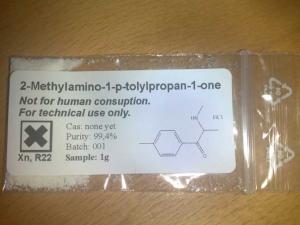Drug War Issues
Politics & Advocacy
The justice ministers of the 27 countries that constitute the European Union (EU) announced Friday that they had agreed to ban the synthetic stimulant mephedrone across the EU. The drug, which is comparable to ecstasy or cocaine in its effects, is already illegal in 15 EU countries.

Mephedrone, now available in Europe only via the black market (image courtesy Wikimedia)
The justice ministers' announcement comes about a month and a half after the European Commission proposed in October that governments act to stop the spread of mephedrone. Friday's decision bans the manufacture and marketing of mephedrone, making those acts a crime anywhere in Europe.
"It is good to see that EU governments are prepared to take swift action to ban this dangerous drug," said Vice-President Viviane Reding, the EU's Justice Commissioner in a statement Friday. "This drug is sold over the Internet, often behind innocent names like plant food or bath salts. Young people should not be fooled. These drugs are harmful. The EU has shown today that we can act quickly to stop this kind of drug from taking more lives."
The move comes after a wave of hysterical reporting about mephedrone, especially in the British press, and after a risk assessment by the European Monitoring Center on Drugs and Drug Addiction (EMCDDA). That assessment found that while mephedrone can cause acute health problems and lead to dependence, there have been few verified fatalities reported across Europe.
Britain reported two fatalities in which mephedrone appeared to be the sole cause of death, but it later turned out that those two deaths had been caused by methadone, not mephedrone.
In fact, the EMCDDA risk assessment noted that despite health dangers, there is no direct causal link between mephedrone alone and any deaths. The risk assessment also warned against banning the drug. "Control measures could create an illegal market in mephedrone with the associated risk of criminal activity," the assessment warned.
The EMCDDA noted that 37 deaths had been "linked" to mephedrone, but warned against jumping to conclusions. "In some of these cases it is likely that other drugs and/or other medical conditions or trauma may have contributed to or been responsible for death," the assessment noted. "The inquests into the deaths are pending for the majority of these cases therefore it is not possible at this time to determine the contribution of mephedrone."
And while the risk assessment noted health dangers with the drug, including headaches, nausea, agitiation, palpitations, chest pains, paranoia, teeth grinding, and sexual arousal, it found that serious side effects such as seizures or abnormal heart rhythms were "rare."
"Taken as a whole, the scientific evidence base available for drawing conclusions is limited and this proviso should be borne in mind when interpreting the findings of the risk assessment exercise," the EMCDDA warned.
Too bad the EU doesn't listen to its own advisors, instead choosing to play to the sensationalist media peanut gallery.
This work by StoptheDrugWar.org is licensed under Creative Commons Attribution-ShareAlike 4.0 International
Comments
Remember David Nutt
"Too bad the EU doesn't listen to its own advisors..."
Just like the UK Home Office sacking David Nutt last year, because they didn't like the science.
EU bans mephedrone production & supply
The UK was ahead of the game on its EU neighbours, banning the supply and possession of mephedrone (and other cathininones) in April 2010 - in a similar panicky way to the EU decision last month. What has been the outcome of this move? Well hard data for 2010 is still limited, but the available evidence shows that (1) illicit mephedrone dealing began immediately after the ban, and (2) other 'legal highs' with amphetamine-like effects have replaced it, including MDAI and prolintane. The worst of the latest batch of mephedrone replacements currently seems to be A3methano (methanobenzazepinetetrahydro-hydrochloride), for which there are already reports of unpleasant effects - from physical agitation to psychotic reactions. In short, prohibition works like the Hydra in mythology - you cut off one head and several more (often with nastier bites) emerge to replace it. Demand generates supply, and just the as huge surge in mephedrone use in the UK was strongly generated by the reduced availability and purity of cocaine and ecstasy, so has the recent surge in use of new uncontrolled stimulants been generated by the banning of mephedrone and cathinones. Out of the frying pan into the fire, out of the fire into a furnace...
Add new comment